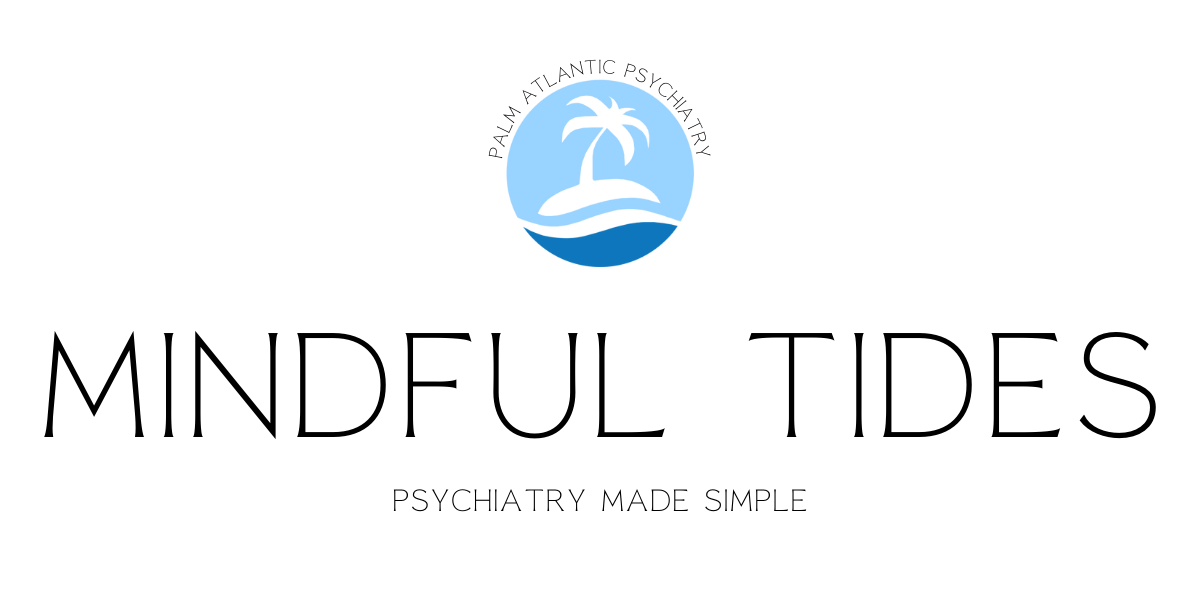Managing Seasonal Affective Disorder (SAD) During the Holidays
Tips for a Brighter Season

As the holiday season approaches and the days grow shorter, many people begin to experience a dip in mood and energy. If you notice that your mood changes with the seasons, you may be dealing with Seasonal Affective Disorder (SAD), a type of depression that typically occurs in the fall and winter months. SAD can make the holiday season feel overwhelming, but there are ways to manage the symptoms and enjoy this time of year.
At
Palm Atlantic Psychiatry, we understand the impact of
Seasonal Affective Disorder and are here to help you navigate through it with professional support and practical tips. In this post, we’ll explain what SAD is, its symptoms, and how you can manage it this holiday season.

What is Seasonal Affective Disorder (SAD)?
Seasonal Affective Disorder is a form of depression that is related to changes in seasons, typically beginning in late fall and continuing into the winter months. The reduced sunlight during this time can disrupt your body's internal clock and lead to changes in mood, energy, and overall well-being.
Symptoms of SAD
- Low energy and fatigue
- Difficulty concentrating
- Increased need for sleep
- Loss of interest in activities you once enjoyed
- Feelings of sadness or hopelessness
- Increased appetite or weight gain, particularly cravings for carbohydrates
If you experience these symptoms regularly during the colder months, you may be dealing with Seasonal Affective Disorder. The good news is that SAD is treatable, and there are many ways to manage its symptoms.
Tips to Manage Seasonal Affective Disorder During the Holidays
The holiday season can bring additional stress and pressure, but by taking proactive steps to manage SAD, you can maintain your mental health and make the most of this time of year. Here are some strategies to help you manage Seasonal Affective Disorder:
1. Light Therapy
One of the most effective treatments for SAD is light therapy. Exposure to bright light can help regulate your circadian rhythm and improve mood by mimicking natural sunlight. Using a light therapy box for about 20-30 minutes each morning can be beneficial in lifting your mood and increasing energy levels.
How to Use Light Therapy:
- Use the light box in the morning, ideally within an hour of waking up.
- Make sure the light box provides 10,000 lux of light and is specifically designed for treating SAD.
- Sit about 16-24 inches away from the light source, ensuring that the light enters your eyes indirectly (but don’t stare directly at it).
Search for: Light therapy for SAD near me or best light therapy boxes for Seasonal Affective Disorder to find options that work for you.
2. Get Outdoors and Soak Up Natural Light
Even though the days are shorter, getting outside as much as possible can help alleviate the symptoms of SAD. Exposure to natural daylight—even on cloudy days—can increase serotonin levels and improve mood.
Ways to Increase Exposure to Natural Light:
- Take a short walk during daylight hours, especially around midday, when the sun is at its highest.
- Keep your curtains open and sit near windows to let in as much natural light as possible.
- Plan outdoor activities such as hiking or going for a brisk walk during the weekends.

3. Stay Active with Regular Exercise
Exercise is a powerful tool for managing depression, including SAD. Regular physical activity can help reduce stress, improve mood, and increase energy levels by boosting the production of endorphins and serotonin.
Exercise Tips for Managing SAD:
- Aim for at least 30 minutes of exercise most days of the week.
- Try yoga, walking, or swimming, which are gentle but effective ways to reduce stress and improve mood.
- Consider group fitness classes or virtual workouts to stay motivated during the colder months.
4. Maintain a Consistent Sleep Schedule
SAD can disrupt your sleep patterns, leading to oversleeping or difficulty waking up in the morning. Maintaining a consistent sleep schedule is essential for regulating your body’s internal clock and improving your mood.
Sleep Tips for SAD:
- Go to bed and wake up at the same time every day, even on weekends.
- Limit naps, as excessive daytime sleeping can interfere with nighttime rest.
- Create a calming bedtime routine, such as reading or meditating, to help signal to your brain that it’s time to sleep.

5. Watch Your Diet
The cravings for carbohydrates and comfort foods that come with SAD can lead to weight gain and further dips in energy. Focus on maintaining a balanced diet that includes plenty of fruits, vegetables, whole grains, and lean proteins to help regulate your mood and energy levels.
Dietary Tips for Managing SAD:
- Include omega-3 fatty acids in your diet (found in fatty fish like salmon) to support brain health and mood.
- Stay hydrated and limit sugary snacks and processed foods that can cause energy crashes.
- Consider vitamin D supplements, especially if you have limited exposure to sunlight.
6. Social Connections Are Key
It can be tempting to isolate yourself during the winter months, especially when you’re feeling down. However, maintaining social connections is crucial for managing SAD. Spending time with friends and family can provide emotional support and help combat feelings of loneliness.
Social Connection Tips:
- Schedule regular calls or virtual check-ins with loved ones.
- Attend social gatherings or holiday events, even if you don’t feel up to it—it may lift your spirits.
- Join a local support group for individuals dealing with
SAD
or other forms of depression.

7. Seek Professional Help
If you’re finding it difficult to manage the symptoms of Seasonal Affective Disorder on your own, it may be time to seek professional help. Palm Atlantic Psychiatry offers both in-person and Telepsych services to help you get the support you need from the comfort of your home.
Treatment Options Include:
- Supportive therapy to help you identify and change negative thought patterns associated with SAD.
- Medication management, if necessary, to help balance chemicals in the brain that affect mood.
- Telehealth psychiatry services in Florida, making it easy for you to access professional care wherever you are
- Holistic treatment options for individuals who prefer an integrative approach
If you’re searching for SAD treatment in Jupiter, FL or need support managing Seasonal Affective Disorder during the holidays, we are here to help.
Final Thoughts: Enjoy the Holidays with a Brighter Mindset
Seasonal Affective Disorder can make the winter months challenging, but with the right strategies, you can manage your symptoms and enjoy the holiday season. From light therapy and regular exercise to maintaining social connections, there are many tools you can use to keep your mood elevated.
If you’re struggling with SAD, don’t hesitate to reach out to Palm Atlantic Psychiatry. Whether you prefer in-person or virtual appointments, our team is ready to help you navigate this time of year with personalized care.
Contact Us Today
Ready to take the first step toward managing your Seasonal Affective Disorder? Contact Palm Atlantic Psychiatry at
(561) 625-9695 or visit our
website to schedule an appointment.






